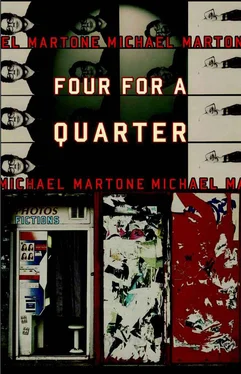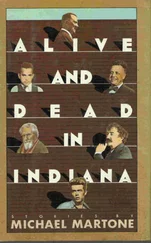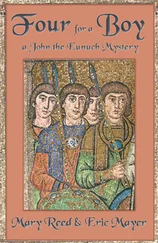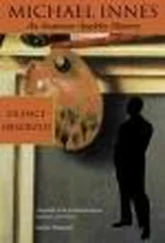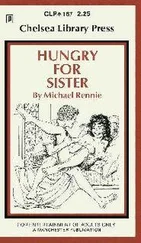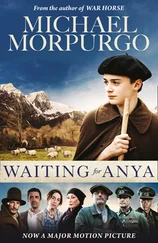“Come on out, Russian,“ and “Now's your chance.“ Between each chorus, they would pause to listen, then huddle, deciding what to say next. Lining up again, my father would pace them, “one, two, three,“ directing with his hands.
“We're waiting.“
A Funk Seed Hybrid sign was on the fence by the road. The cornfield was empty. There was not even an echo.
“He's not coming,“ someone said, and we got back in.
Starting up the road again my father said that it was a shame I had to see trials in a year when turbine cars were entered. “I miss the sound,“ he said. He waved his head as if following an imaginary vehicle from left to right and pursed his lips together to imply a sound, because that was what the new engines did. Imply a sound.
We stopped once more that night. A few miles from home we pulled off into a closed weigh station. I got out and climbed the ladder to the roof of the motor home. The siding was cold as I sat down under the TV antenna cocked like a cafe umbrella. Across the highway was an identical station. It was Closed, too. Beyond that was a barn. Visible in the circle of the mercury light was the name of the place, Belle Acres, painted below a smiling image of the Good Sam Club that spotted the dark barn, a hex sign. Good Sam smiled broadly, eyes bugging, his halo tilted back out of the way.
My father and his friends were running races up and down the driveway. They ran heats, two or three men at a time. Someone sat at the finish line with a folding TV table and campstool keeping score. As they ran, their shadows spiraled around their feet, scooting between the pools of light.
Father ran easily, won his heat, slowed down way beyond the finish line, and then turned and limped back up the apron. I applauded alone until I was interrupted by a car honking its horn as it went by on the interstate. I turned to wave. A new race started. Father, passing on his way back to the starting line, looked up at me and jerked his head from left to right performing the first half of a double take, pretending to hum along as the silent racer paused before his eyes. He hobbled back up the drive toward the hut, where his friends were jumping up and down on the scale. He bent over now and then to catch his breath.
They ran a few more heats until the man at the TV table fell asleep and put his head on his hands. The Erhmans led a walking tour north, toward home, examining shoulder material. As they began to sing, they disappeared into the night.
Father and I went back inside the motor home and started up the engine, waiting for them to return. More and more trucks appeared on the highway. The sky paralleled the black field, leaving a space in between. He listened to a horn blasting down the road and to the engine beneath our feet. “Something's missing,“ he said, swiveling in the captain's chair. He talked until the engine died, out of gas, fitting word into word until I finished sentences he had started. I could no longer tell where we were by the sound the night was making. But by then it didn't matter; we had been carried on, by the dead center, to where it already was the next day.
The Deaths of Modern Philosophers
1.
One philosopher, while eating a piece of bread, steps into a street in Paris and is run over by a bread truck. It is said he looked both ways. He had torn a bite-sized piece of bread from a baguette, placed it in his mouth, and begun to chew. He stepped into the street. He stepped into the street either with his left foot or his right foot, and it is always a street, not an avenue or boulevard. There, he was run over by a milk truck. Or he was run over by a bread truck. It depends upon which version of the story one hears. That it was a truck seems to be important, and that it is some kind of truck is important also. For a long time, it seemed to be a “milk“ truck, but now it seems to be some other kind of truck, “milk“ trucks being rarely, if ever, seen on the streets of Paris and, thus, an inaccurate detail. So it became a “wine“ truck instead for a while and then a “bread“ truck when it was remembered the philosopher was eating bread when he was run over by a truck in a street in Paris. It was at this moment, when the moment was remembered fully, that the truck that ran over the philosopher became a “bread“ truck.
2.
Another philosopher was killed while smoking on a veranda. It was after the war. Or it is thought the philosopher thought it was after the war. Or that the war, recently not over, was now over and the precautions one takes during a war, such as staying out of sight and not calling attention to your position by the glowing ash tip of your cigarette, were, now that the war was over, not as pressing as they had been only days before. I should mention that this philosopher was not a combatant, not a soldier, but an ordinary civilian albeit a modern philosopher of some notoriety. And it was night. And the war was over. It was a pleasant night, warm, not humid, comfortable. An air of sadness attaches instantly to this incident's gesture of joy. The act of smoking in the open after the war is over! Lighting up under the stars after years of smoking in blacked-out interiors. I imagine, as he was shot on a veranda, that the philosopher emerged onto said veranda by means of large French doors, the glass of their mullions miraculous survivors of the same said war. The opaque curtains billow in the doorway as the philosopher strikes a match, drawing the attention of a nearby nearly invisible partisan sniper. However, we can never be sure. Some would argue the recklessness of the act, that though the philosopher knew the war was over he would surely also know that not everyone would know the war was over. There was still a risk at showing oneself. And there is this final mystery: One survives by one's wits for so long and then survives only to the moment of one's not surviving any longer.
3.
In the movie we will be making about the deaths of modern philosophers not all the deaths we hoped would be of the nature above. Not all deaths of modern philosophers can be the results of freak accident or chance, can they? Not all can be hit by milk trucks while crossing the street or be shot while smoking on verandas a few days after a war is over. Some must die of natural causes or, at least, diseases that, in a way, are natural and, in a way, are not natural. In our research we have asked living philosophers how dead philosophers have died. Invariably the living philosophers tell only the stories of the deaths of the dead philosophers that dramatize these ironies or paradoxes. These anecdotes are certainly visual, which is a necessary ingredient as we are making a movie, but we would like to have uncovered a death of a different sort to give relief to the pattern of deaths that was emerging. There was the report, mentioned by several philosophers, of the philosopher who was preserved and stuffed after he died, and kept in a closet at a college. But this, strictly speaking, wasn't so much the actual death of a philosopher but the way death, for this particular philosopher, was being spent. There was a question also as to this philosopher, while he was living, living outside the range of what we meant as “modern,“ though his body, in death, has definitely survived into the period we are now calling “modern.“ We did see the potential in the possible scene. The camera panning around the perfectly still philosopher. He has been posed seated and affixed to a wheeled chair. The antique quality of his clothing is, perhaps, a shade more bizarre than his own taxidermy. Perhaps, too, we could, during this moment of contemplation, add to the film another level of contemplation, i.e., the filming of the filming of the dead philosopher, the two cameras using the same track circling the body and in the final shot, the one shown to an audience, employing footage from both cameras. There would always be a camera in the frame with the stuffed body. We haven't ruled this out yet.
Читать дальше
